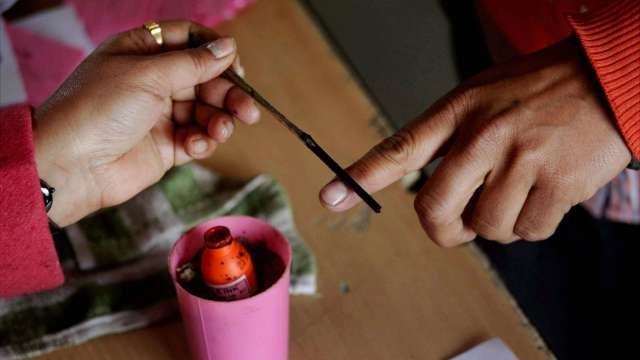
Even though AAP MLA Amanatullah Khan smells an anti-Muslim conspiracy in poll dates overlapping with the month of Ramzan, many in his constituency do not think so. In contrary to what the AAP leader said, many in his constituency believe that the impact of polling percentage due to Ramzan, even if any, would be negligible.
The indifference of Muslim voters towards the issue exemplifies a disconnect between the AAP leader and voters in his constituency. It also seems to confirm Opposition parties' fear that a long-drawn election season will give BJP leaders, including Prime Minister Narendra Modi, more time to campaign, claim experts.
Dr Kamaal Ahmed, a health professional from Amanatullah's constituency Okhla, says that though he feels that Muslims are increasingly being terrorised during the Modi regime, it would be wrong to say that voting dates coinciding with that of Ramzan would have a negative impact on the poll percentage of the Muslim community.
"During the month of Ramzan, we carry on our regular lives as usual. Fasting does not stop us from performing our duties to our families, then how can it stop us from performing our duty to our nation,” he asked.
“The voting time is such that it does not coincide with our religious duties to be performed during the month of Ramzan. I do not think that it would have any serious impact on the poll percentage of the Muslims,” added Dr Ahmed, who runs a clinic in Shahin Bagh.
Dr Ahmed’s view on the issue tally with that of AIMIM leader Asadudin Owaisi who slammed poll date sceptics. “As a Muslim, I welcome the election in Ramzan. Muslims are more devotional in that month,” he said.
Adding that those who are opposing poll dates in Ramzan do not understand Islam, Owaisi added, “Election is a long process. We fast and vote in Ramzan. This Ramzan, the Muslim vote percentage will be increased. We will defeat evil forces.”
Significantly, soon after the poll dates were declared Amanatullah said that elections were being held in Delhi on 12 May to help BJP.
“There will be less polling among Muslims, and it will directly benefit the BJP,” he had said.
Amanatullah's remarks immediately support from leaders in Congress and Trinamool Congress who claimed that apart from Delhi the poll dates in Ramzan would cause inconvenience to Muslim voters in Bihar, West Bengal and Uttar Pradesh.
Reacting to the controversy, the Election Commission had said that the entire month of Ramzan could not be excluded from the poll schedule but main festivals and Fridays have been avoided.
Mohammed Adam, another AAP supporter, however, does not buy the conspiracy theory. He, however, says that the polling dates coinciding with Ramzan may create problems for elderly rozadars.
“We should not suspect the intention of constitutional bodies like the Election Commission. They have to function within various constraints that emerge in the field. But I believe that it could have preponed or postponed the polls to ensure that the poll dates do not fall in the month of Ramzan, for elderly rozadars may face problem in travelling to polling booths while fasting,” said Adam, an Islamic Scholar and resident of Jamia Nagar.
He also suggested that it would be better if special vehicles are provided by the Election Commission to the elderly to travel to the polling booths.
On the other hand, advocate Aashu Khan, a resident of Jamia Nagar agrees with Amanatullah ’s theory and says that there could be a conspiracy to suppress Muslim voting during the polls. But when reminded that during Ramzan Muslim voters perform other duties unhindered, he said, “I am not sure whether voting would get affected but people would face difficulties to vote during the month of Ramzan."
Shamsad Khan, a shopkeeper in Zakia Nagar, believes that the entire issue is being raised to polarise Muslim votes even though the poll dates are a non-issue for Muslim voters.
“The Hindu-Muslim thing is a big feast for the political parties during the election season. They are just trying to polarise Muslim voters by raising this issue,” he said.
But what Shamsad did not notice is that polarising always has a dual impact. If an issue polarises the minorities, it's also likely to polarise the majority in the opposite direction, which will not help Amanatullah and his party. There is hardly any scope to believe that Amanatullah would like to see Hindu votes polarised against the AAP.
According to Apurba Kumar Baruah, political commentator and retired professor from North Eastern Hill University, the criticism over poll dates is likely to have more to do with the Opposition's fear that the seven-phase election gives Prime Minister Narendra Modi optimum opportunity to exercise his campaign prowess.
"The seven-phase election would not only help the ruling party campaign more but also help it influence the voters in all other possible means," he says.
In an interview with ANI, earlier this week, Anamanatullah had said in clear terms that voting should be done in five phases and not on seven phases. “Ramzan is going to begin on 6 May. The Election Commission should have conducted the polls in five phases instead of seven. They deliberately did this and brought three phases (of the polls) during Ramzan period. In these phases, the Muslim population, particularly in West Bengal, Uttar Pradesh, Bihar and Delhi will be in substantial numbers. It will be arduous for Muslims to exercise their franchise,” he had said.
But given the reaction of residents of his constituency, it is clear that his fear lies not in the inconvenience of the Muslims, but the fact that it gives Modi enough time to exploit his campaigning ability. Limiting the Lok Sabha Election to five phases would also mean limiting his scope.


.jpeg)

